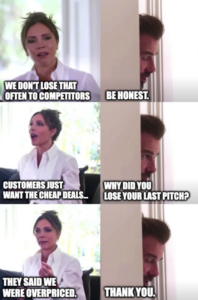Humbly beginning: 5 questions to answer before building a value proposition

Having a clear value proposition for your product or service is the gateway to impactful content, engaged customers, and a strong competitive position.
But defining it can feel a bit like wading through murky waters.
To develop a clear value proposition, you need to pitch it right in relation to the market, your customer, and your product or service capabilities. But mastering this trifecta can be tricky, especially when you’re faced with competing views across sales, product, and marketing teams.
Your big job is to find the single truth.
To sift out the assumptions from data-backed information, the aspirations from the present-day reality, and the blanket statements from the specifics. By doing that, you’ll have some solid foundations to build a value proposition that’s competitively positioned, differentiated (or, at the very least, distinctive), answers the customer’s needs, and reflects the strengths of your offer.
How do you do that? By answering these 5 key questions before you start.
1. What do we actually offer?
You might know this already – and that’s great. But when we ask this as part of our discovery process, it usually doesn’t take much prodding to uncover a few question marks.
When it comes to the nitty-gritty of your product – capabilities, features, sustainability credentials – it’s common for this information to be buried with the product team. And what’s more, there’s often some confusion around what’s available now vs. what’s on the roadmap.
It’s a humbling process, but going back to basics is worth doing to get complete clarity.
2. Who (or what) are we competing with?
There are two types of competitors you’ll want to think about…
For most businesses, correctly identifying the companies you’re in competition with is the main priority – you’ll need to understand who you’re competing with and how they position their product or service to customers. Your sales team can often provide useful information on this.
Then there’s the competitive alternative. Rather than a rival company, the competitive alternative is the solution your customer would land on if they didn’t have access to the type of product or service you’re offering.
For example, a customer looking for better ways to sort and leverage their data might not just be choosing between two or three data management companies but rather weighing up the benefits of investing in data management software or continuing to use an overly manual process that relies on Excel spreadsheets.
In a lot of instances, the competitive alternative can also be simply ‘doing nothing.’ If that’s the case, you’ll need to create compelling reasons for them to do something – especially where sticking with the status quo is likely to be more harmful to their business.
Knowing your competitors from your competitive alternatives will help you to develop a value proposition that really lands.
3. Where do we win against competitors?
Do you know why customers choose you? If you don’t, you need to find out. Speaking to either your sales team or, better yet, speaking to customers directly will help you understand where they see value in your offer over the competition.
4. Where do we lose against competitors?
Time to turn on your bull***t radar.
No one likes to admit their weaknesses – and this applies to businesses, too. In our experience, this question is the one that’s most likely to elicit vague, waffly, or straight-up avoidant answers.

When you know what’s really going on, you can focus on addressing the problem. In this case, there’s a job to be done around building the perception of value, as opposed to high cost.
5. What’s the ‘magic dust’ for our customers?
What’s the one thing that sets you apart from the competition, summarises the core strength of your offer, and delights your customers?
Once you’ve answered all the other questions, this one should be clear – and, importantly, the answer will be based on real truths about your product or service rather than just gut feel.
That’s the magic dust. And it’s a great place to start when building out your value proposition.
So go forth and happy hunting for your single truth in the murky waters.
And if you need help finding answers, you know where we are.
(Photo by Kenny Eliason on Unsplash )

